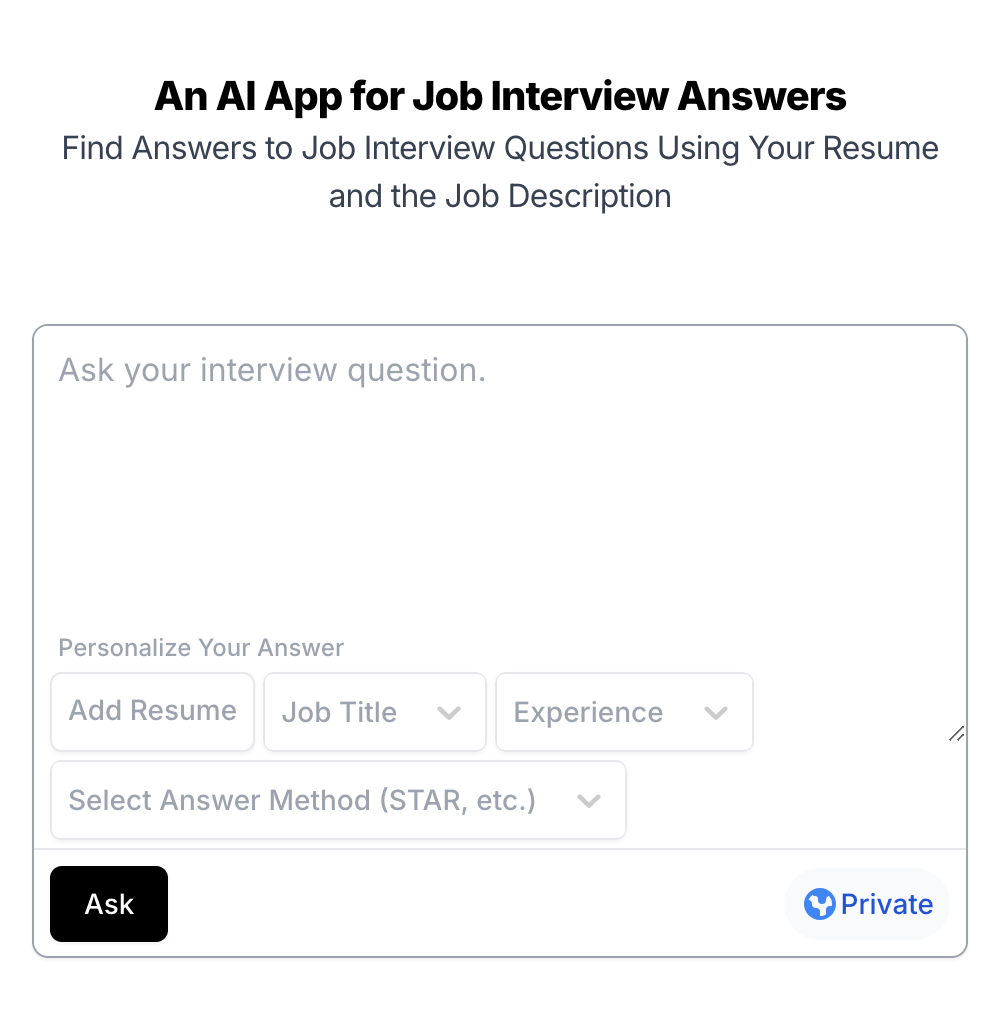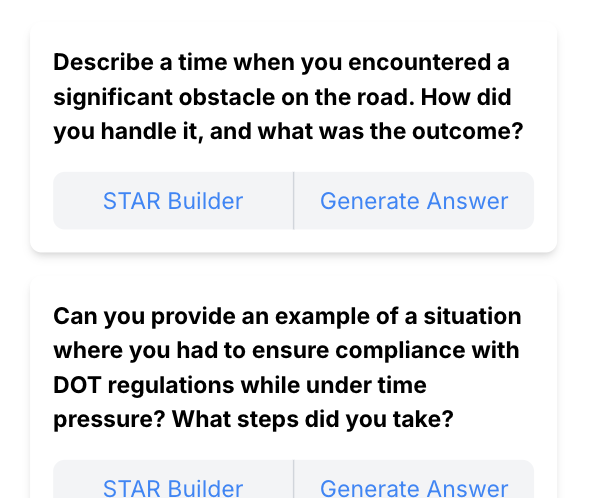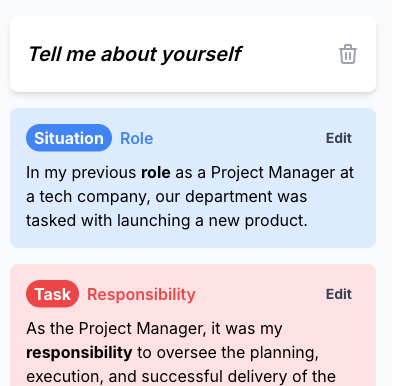- Resume Templates
- Resume Examples
- Free Resume Builder
- How to Write a Resume
- Resume Format
- Resume Packs
- Cover Letter Templates
- Cover Letter Examples
- Free Cover Letter Generator
- How To Write a Cover Letter
- CV Templates
- CV Examples
- Free CV Maker
- Resume Help
- Cover Letter Help
- Job Interview
- Career Advice

18 Hypothetical Questions Interviewers Ask And How To Answer Them
Are you preparing for a job interview? Congratulations! Your prospective employer believes you may be a new team member. However, they still need to understand if you can fit well into the new environment. This is why hypothetical interview questions have become increasingly common.
What Are Hypothetical Questions In An Interview?
Hypothetical questions involve putting a candidate in an imaginary situation and asking them to explain how they would handle it in real life. You can spot such interview questions by looking out for phrases such as “what would you do if…?” and “how would you respond to…?”.
Employers love hypothetical questions as they indicate the strength of candidates’ analytical and interpersonal skills. That’s why hip tech companies like Google and Facebook often ask probing hypothetical interview questions — to find the most promising, well-rounded talent with a combination of hard and soft skills.
For instance, here’s a sample hypothetical question that a prospective Product Quality Analyst was asked at Google :
“A restaurant opened in Alaska yesterday on Google Maps has got 15 reviews. What do you think about this? How can you make sure the reviews are genuine?”
The interviewers are looking for an answer that provides a step-by-step account of how the respondent would investigate the legitimacy of some (clearly rather dodgy) reviews. In this way, the question offers candidates an opportunity to display their business acumen and quick-thinking skills.
Hypothetical scenario questions at Google interviews also often include follow-ups, which encourage you to further explain your line of thinking when tackling a particular problem. For example, follow–up hypothetical scenarios can sound like this:
“A competitor started offering a $5 monthly fee for their email product. What recommendations would you make to your team based on your assessment of the situation?
Follow-ups : Which factors would you consider in your recommendation? What impact on the company would your suggestions make?”
Overall, hypothetical interview questions are common for managerial and executive roles. But they may also come up for several technical roles, especially in software development.
Hypothetical Interview Questions vs Situational Questions vs Case Problems
Hypothetical interview questions are different from behavioral interview questions , which test how well candidates responded to situations in the past. Hypothetical prompts ask you to consider future situations and allow you to get a bit more creative. While you may draw inspiration from past experiences, you must display problem-solving , critical thinking , emotional intelligence , and conceptual skills in your answers.
Case problems, in turn, are a version of a hypothetical interview question that requires you to provide an in-depth analysis of a specific real or mock situation. Mostly, these are written test assignments you do in between interview rounds and then discuss your answers in person. When solving hypothetical scenarios and case problems you need to demonstrate how you apply your skills and domain knowledge to deliver real-world business outcomes. These also test your ability to analyze multiple factors that can influence the outcomes and present your thinking in a logical, well-structured manner.
18 Sample Hypothetical Interview Questions With Answers
Practice is key to doing well in all sorts of job interviews. Here are eighteen hypothetical interview questions and sample answers you can use as a cheat sheet.

Q1. You’re Leading A Project Which Requires Input From A Variety Of Teams. One Of The Teams Is Running Late And Claims They’re Snowed Under With Tasks. How Will You Deliver The Project On Time?
If you’re pepped with a similar question, the recruiter wants to test your people skills and ascertain how effectively you handle a heavy workload. They’re not asking you to rant and rave at the offending team (as tempting as that sounds).
Instead, you need to display your managerial skills . How will you convey the urgency of the deadline? Perhaps you will ask a third party to intervene, such as a more senior manager? Whatever way you decide to handle the situation, demonstrate that you understand the importance of stringent planning and solid communication.
Sample answer:
“First, I would assess the impact of the delayed team on the overall timeline of the project. If their tasks are critical to the project’s success, I would explore alternative solutions such as reallocating resources or outsourcing to ensure timely delivery. If their tasks are not critical, I would work with them to prioritize their workload and provide extra support if needed”.
Q2. You’ve Noticed A Coworker Harassing Another Employee. How Do You Respond?
This is one of the hard hypothetical questions, as it requires you to apply your subjective judgment. The recruiter is essentially testing your personality, and there are no correct or incorrect answers.
You could, for example, assertively intervene and stand up for the harassed employee. If you’re concerned about the repercussions, however, you can inform upper management. Try to answer this question as honestly as possible and give reasons for your judgment.
“I would approach the person privately about the issue first. To avoid sounding accusatory, I usually use “I” statements as in, “I noticed your behavior the other day and it made me uncomfortable”. If they do not acknowledge their wrongdoing and continue with the same course, I would escalate the issue to the management and HR. I believe bullying is not acceptable.”
Q3. Your Manager Has Asked You To Work Entirely Remotely For A Few Weeks. How Will You Maintain Strong Lines Of Communication With Colleagues And Clients?
This hypothetical situation is increasingly likely to pop up in interviews as remote working becomes more common. It tests:
- How dependable you are
- If you are good with asynchronous communication
- How comfortable you are using popular communications software.
Make sure you display your knowledge of different channels, including email, Microsoft Teams, Zoom, Slack, and any other relevant software. Just don’t mention your penchant for sending memes to colleagues.
“To keep the comms going, I’d establish a communication plan for regular check-ins. I usually prefer morning stand-ups where I can quickly talk about my plans/goals for the day, plus address the blockers. Afternoons are usually my “deep work” hours, so I’d avoid planning meetings around that time, but I’d respond to async messages via Slack or Microsoft Teams. Likewise, I’ll ensure that all of my client meetings are documented with notes/memos, and shared with other team members”.
Q4. You Find Out That A Colleague Has Been Inadvertently Breaching Compliance Laws By Sharing Customer Data. How Do You Respond?
This problem tests your understanding of compliance laws and your ability to handle urgent situations with care.
Compliance regulations such as GDPR and CCPA carry huge fines for breaches, so you would have to report the situation to your data governance team. At the same time, it is worth mentioning that you would treat the colleague with kindness and compassion rather than stirring up an argument about their negligence.

“I believe that everyone has the right to make an honest mistake. So I’d approach the person privately first to address the situation and brief them on the current policies regarding customer data (that is if the breach/disclosure was minor). I would strengthen the importance of upholding compliance laws and offer to share some of my tips.”
Q5. Your Manager Has Asked You To Deliver An Important Presentation To A Potential Stakeholder. How Do You Ensure It Goes Well?
Such scenario questions are relatively easy to answer. Focus on describing your organizational skills . Will you use special software to track the process of your project? Who will you reach out to for help? What kind of research will you do to ensure the presentation is as compelling as possible? Provide a comprehensive narrative of your process, and don’t be afraid to toot your own horn.
“My typical strategy is two-step: background stakeholder research (industry interests, affiliation, corporate values, etc). I use LinkedIn and online research to find the person’s public statements and interviews to get a better sense of their personality and professional affiliations. Also, I talk to customer success/service departments to get extra knowledge. Then I customize the presentation, based on the identified pain points and areas of interest, and practice my delivery with the team.”
Q6. You’ve Received Negative Feedback For A Project You Were Initially Proud Of. How Do You Process The News?
We’ve all been there – negative feedback can be soul-crushing and seriously bruise your confidence. Recruiters who ask this question want to discover whether you will crumble under pressure or turn negative situations into positives.
In your answer, acknowledge that you would find the news upsetting (the recruiters aren’t looking for robots!) but that you would attempt to learn from the feedback. Perhaps you would make a development plan or schedule a meeting with your manager to discuss further training sessions.
“I would step back from this for a day to process my emotions. Then once again re-evaluate the feedback holistically to understand in which areas I should improve. If something appears unclear, I’d approach the manager or peers for extra guidance. Overall, I’m open to constructive criticism and treat failure as a learning opportunity. I’d rather fail fast and learn than stay delusional in my beliefs.”
Q7: You’re Introduced To A New Software Product You’ve Never Used Before. How Would You Know That You’re Using It Effectively?
Technology is everywhere in the workplace, so strong digital literacy skills are kind of expected. The purpose of this hypothetical interview question is to gauge your ability to master new software on your own.
Your answer should explain how you’d approach adoption. Give a quick walkthrough. Use a specific example from your last position if you can to give your answer extra validity.
“I’d follow the general onboarding sequence first for the app and check the product documentation. In most cases, this gives me about 70% of the information I need to get started (this was the case with Figma). I’d then give myself a couple of days to play with the features, referring back to the documentation whenever I’m stuck. Also, there are plenty of YouTube tutorials for most software apps. For the most complex questions, I’d approach colleagues or the IT staff to help me progress from a confident to an advanced user.”
Q8: You’re Leading A Sales Demo For A New Client. The Evening Before, Your Team Says An Essential Feature Isn’t Working. What Would You Do?
The purpose of this question is to test your adaptability skills, as well as the ability to come up with creative solutions to unexpected obstacles.
Moreover, the interviewer likely tries to understand what type of risk you’d rather carry: the prospect of losing new business (by postponing a demo) or the prospect of tainting your (and the company’s) reputation during a flopped demo. Your goal here is to demonstrate a tempered, confident response.
“My first step would be to assess the situation and understand the impact of the missing feature on the overall demo. If it’s critical (i.e., supports the main client use case), I’d reach out to the client and request to reschedule the demo by transparently addressing the issue. If it’s an auxiliary feature, I’d customize the demo and use workarounds to showcase the product’s capabilities without the affected feature. Lastly, I would debrief with my team after the demo to understand what went wrong and how we can prevent similar situations in the future”.
Q9: You’ve Noticed That One Of Your Team Members Isn’t Using Their Time Effectively (According To The Company Productivity Dashboard). Yet, They’re Delivering On All Assigned Tasks. How Would You Approach This Situation?
Hypothetical situations like the above are a common “test” for managerial positions. It’s a great segway for talking about your ability to coach, mentor, and empower others at the workplace. Essentially, the interviewer wants to learn more about your leadership style to determine if you’d be a good cultural fit for the team.
Again, there’s no right or wrong answer. Just explain what you would have done in this case and explain why.
“I’m personally averse to micro-management and as long as the employee hits all the KPIs, I’m ok with them keeping odd hours, for example. But if the situation (and data) indicates that the person is struggling with effective time management, I’d lend them some tips during a personal chat.”
Q10: If You Were Asked To Improve One Product In Our Company Portfolio, What Would It Be, Why, And How Would You Suggest Improving It?
Scenario questions aim to test your product knowledge and your core competence for the role. Explain your reasoning for choosing one option over another and give a short walkthrough of your thought process.
Typically, the interviewer will give you some time to think about this problem. Don’t be afraid to ask for extra time if you need to better analyze the problem. Asking clarifying questions is another great way to win extra brownie points.
“Let’s assume I want to improve Acme’s personal finance app. I’ve picked it because it’s a new product (launched in Dec 2023) and it’s still at the MVP stage. To prioritize features and develop a new roadmap I would: a) Analyze current user metrics (Activation rate, churn, daily and monthly unique visitors). Then dive into the user research and beta testing feedback to better capture the sentiment on likes, wants, needs, and dislikes, before determining the next steps. I’ve chosen this product because it’s definitely in demand and can be a great channel for up-selling your wealth management products.”
Q11: The Leadership Wants To Increase The Time-To-Market For New Software Releases. However, They’re On The Fence About Increasing Budgets. What Would Be Your Suggestions?
This question is more realistic than hypothetical for most project and product managers. Stakeholders often press for faster results all the time but aren’t as eager to commit monetarily. Your answer must demonstrate strong negotiation skills. Show how you can win over people with persuasion and properly manage expectations.
For example, you can mention specific techniques that you’re using (e.g., the go big and then go small method) or mention how you’d use data to build your arguments. Your goal is to persuade the interviewer that you’re good at persuasion. 😊
“My tactic would be twofold. I would first present the status quo aka current team velocity and average release time to push the stakeholders towards asking the “golden question” aka how can this be fixed. Then I’d lay out the options: Automate releases with a better DevOps toolkit with estimated data on impact. Once I sense they’re on board with my thinking, I’d go for the ask — imply that to do so, the IT team will need an extra budget of X for new software.”
Q12: One Of Your Team Members Feel Sick Just Before An Important Deadline. The Team Has A Strong Dependency On Their Input. What Would You Do?
With this tricky hypothetical interview question, the interviewer wants to see your adaptability. How well can you cope with stressful situations? Will you crumble under pressure?
A strong answer will showcase some creative problem-solving abilities. It also gives you room to demonstrate your leadership potential by saying that you’d try to make lemonade out of the lemons you’ve got.
“I’d think of ways to remove that dependency. Can I do their task(s) instead? Does anyone else on the team have the skills or authority to make that happen? Depending on the circumstances, I’d try to find the best way to have the project completed before the deadline. And if that’s in no way possible, notify others about the delay.”
Q13: You’ve Noticed That One Of The Employees Always Skips Some Steps In The Standard Operating Procedure. How Would You Deal With This?
The purpose of this answer is to test your integrity. Will you do the right thing when you see that other employees cut corners? On the other hand, this can be a “trick” hypothetical interview question, aimed at testing your ability to think critically and propose process improvements.
A smart thing to do is to first counter this with something like “How important is this SOP? Is it critical to employee safety or just a slightly redundant legacy process?”. Then adjust your response based on the follow-up deets you get.
“I’d approach the person and ask why they’re doing so. If they’re skipping them because they believe these are redundant, I’ll look into ways to optimize the said process to reduce the number of checklist steps. But if they don’t make a good case for their behavior, I’d make a verbal remark first, and then offer them to complete extra training.”
Q14: Imagine You Were Put In Charge Of Improving The Company Diversity Program. What Would Be Your First Steps?
A variation of the above can be a case problem for someone in a managerial or executive role. What the interviewer wants to see is your standard approach to planning and initiating new projects aka your conceptual skills . Demonstrating experience with change management is another thing you could do to win extra points.
“First, I’d look into the current program’s shortcomings. In particular, I’d want to see the metrics like representation, retention levels of different work groups, and general ERG participation levels. If this data isn’t available or goes back to over a year, I’d re-run the analytics. Next, I’d present the findings to the HR leaders and jointly work towards clarifying the new objectives. I prefer to have one North Star goal and 2-3 adjacent goals to both secure some quick wins to create buy-in and diligently work towards a more complex, long-term goal.”
Q15: You’ve Received Feedback That Your Team Isn’t Innovative Enough. You Disagree With This Statement. How Would You Act?
Managers often have to deal with inconclusive or non-constructive feedback from the higher-ups and peers. By probing you with this question, the interviewer wants to better assess your personality and conflict management skills. Your goal is to show that you can put your emotions aside when you face criticism and have a constructive dialogue even when you’re dealing with an opposing POV.
“Well, I’d first investigate if there are good grounds for making such a claim and provide evidence to the contrary. For example, speak of the type of new technologies we have recently incorporated or process improvements made. I’d also try to understand what made the opponent draw such a conclusion. Their opinion may indeed shed light on some aspects that I’ve overlooked.”
Q16: The Company Leadership Pushed For A New Team Objective. You And Your Team Believe That It Would Be Unrealistic To Achieve Within The Set Time Frame. How Would You Navigate The Issue?
This is another example of the popular what would you do in this situation questions interviewers may ask to evaluate your interpersonal skills . They’re also wondering how well you can confront more senior peers when the situation calls for that.
A good answer won’t be inert. On the contrary, you must show that you can professionally push back on unrealistic demands and reconcile everyone’s expectations.
“I’d ask for a follow-up call with the leaders and present my case for why the target is unrealistic. For example, let’s say they want to reduce the customer acquisition costs by 2X in the next 6 months. I’d argue that we can certainly do that by removing PPC from the marketing mix, but doing so will likely reduce our lead volumes by anywhere between 30% to 50% and revenues respectively. Then I’d walk them through other options that can be more long-term (e.g., 12+ months), but can eventually lead to lower CAC.”
Q17: One Of The Client Projects Is Running Over Budget. What Actions Will You Take And How Will You Communicate The Issue To The Client?
The ability to lead slightly awkward, but highly important conversations like the above, is critical for all customer-facing roles. Your answer must demonstrate that you can break the hard news well and defuse any possible tensions.
The best way to answer this hypothetical interview question is using the STAR method when answering this question. First, paint the picture. Next, tell what your key task is, then describe the actions you plan to take, and conclude with the outcome you’d expect to get.
“Let’s say a client keeps changing the brief requirements for the MVP prototype because they get new user research data (that happened quite a few times in my career). My task is to gently remind them that this increases the number of re-works our UX team does — and the total paycheck respectively. I’d schedule a quick call with them to describe that this type of action is out-of-scope as per our current contract, draw their attention to the extra billing incurred so far, and suggest ways to keep this leaner and more cost-effective. For example, we can package new requirements into the next Sprint, rather than address them immediately”.
Q18: A Key Employee Resigns Three Months Before The New Product Release. How Would You Ensure That Everything Stays On Track?
The current business climate is anything but predictable these days. Shifts in consumer demand, supply chain issues, interest rate hikes, mass resignations, global climate, or health events — the risk radar leaders face is big.
The intent behind such hypothetical questions is to assess both your project management skills and personal resilience. How quickly can you adapt to the new circumstances? Can you rescue a project at risk of going into havoc? Talk about your experiences with operating in crisis mode.
“A similar thing happened to me once, although the employee was out due to severe trauma after a car accident. They’re ok now! As soon as I got the news, I got straight to my Gantt chart and began reallocating their duties to other team members and myself. I’ve also adjusted some timelines and reduced the scope of one feature to ensure that we still release on time.”
How To Answer Hypothetical Interview Questions?
Most hypothetical questions require candidates to provide some kind of narrative or a description of a logical process in this way. The precise nature of the questions will, of course, differ by industry. But the answer structure will always be the same: You need to provide your opinion or assessment of the situation, describe your actions, and then state why you came up with this response (aka explain your thought process).
To give an answer that makes the recruiter feel as amazing as hitting all green lights during rush hour, you can also apply these three tips:
- Answer as if you’re already hired for this role. First of all, doing so helps you come up with a more relevant, meaningful response. Secondly, it helps the interviewer picture you in this role (and your goal is to make them like what they see).
- Pick one problem at a time. When a hypothetical scenario asks you to evaluate multiple possibilities or describe quite an ambitious project, don’t try to cover all the grounds. Instead, anchor your answer to one variable (e.g., one aspect of the program you want to improve or one marketing strategy you’d want to improve). This way you can show deeper expertise and analysis, rather than just share some high-level, blanket statements.
- Don’t be afraid to make assumptions. By design, most hypothetical interview questions are rather vague to appeal to a wider range of candidates. But you can make them more relevant to your experience and your skill sets by enhancing them with assumptions. For example, rather than just talking about “a project”, describe a “6-month sprint for releasing a new front-end for a fitness app” and then build your further answer from there. Rich descriptions make it easier for the hiring manager to picture you doing this type of work.
So, there you have it – a good roster of sample hypothetical interview questions to practice. While you may not get the same scenarios during your next interview, these are a great starting point for practicing. Consider solutions to common problems in your industry and write down why you’re the perfect person to solve them. Hypothetical questions aren’t rocket science, but they require creative thinking — and you sure have plenty of that!

Elena runs content operations at Freesumes since 2017. She works closely with copywriters, designers, and invited career experts to ensure that all content meets our highest editorial standards. Up to date, she wrote over 400 career-related pieces around resume writing, career advice... more
you might also like

35 Questions to Ask the Hiring Manager During the Interview

6 Examples of Personal Values to Bring Up in an Interview


Swipe-Worthy Going Above And Beyond Examples For Your Interview

14 Culture Fit Interview Questions with Sample Answers

18 Flight Attendant Interview Questions (With Winning Answers)
Leave a response cancel reply.

Hypothetical Interview Questions: What You Need to Know
Fri Aug 23 2024 • Author: InterviewPro AI
Table of Contents
What are they.
- Common Examples
Answer Length
What to avoid saying, possible follow-ups.
- More Follow-Up Questions
When They're Asked
Who asks them, why they matter, how to answer well, answer structure.
Hypothetical questions ask how you'd handle made-up situations. Employers use them to see how you solve problems, make decisions, and deal with tough scenarios. They want to know how you think and approach work challenges.
5 Common Examples
- How would you handle a disagreement with your manager?
- What would you do if you caught a coworker stealing?
- How would you prioritize multiple urgent tasks with conflicting deadlines?
- If you had to explain our product to a five-year-old, how would you do it?
- What would you do if a client was unhappy with your work?
Try to keep your answer to about 1-2 minutes . This gives you enough time to explain your thoughts without talking too much. Your answer shows how you solve problems, so keep it short and clear.
Don't say these things when answering hypothetical questions:
Don't give very short answers Bad example: "I'd just fire them." (when asked how to handle an underperforming employee) Why it's bad: This doesn't show how you think or solve problems.
Don't say it would never happen Bad example: "That would never happen in my department." Why it's bad: This shows you can't think creatively or adapt.
Don't suggest anything unethical or illegal Bad example: "I'd cover up the mistake to avoid getting in trouble." Why it's bad: This makes you look dishonest and untrustworthy.
Don't say you don't know without trying Bad example: "I have no idea how I'd handle that." Why it's bad: This suggests you can't solve problems or won't try.
Don't go against company values Bad example: "I'd ignore company policy and do what I think is best." Why it's bad: This shows you might not fit in with the company culture.
Don't give an answer without explaining why Bad example: "I'd just outsource the whole project." Why it's bad: The interviewer wants to know how you think, not just your final decision.
Don't show a lack of teamwork Bad example: "I'd tell my coworkers to figure it out themselves." Why it's bad: This suggests you might not work well with others.
Show that you can solve problems, make good choices, and think quickly in a professional way.
After you answer, the interviewer might ask more about your thinking. They could ask about:
Your reasons : They might want to know why you chose that approach. Example: "Why did you decide to handle the situation that way?"
Other options : They could ask what else you thought about doing. Example: "What other options did you consider before settling on this approach?"
Possible problems : They might ask what could go wrong with your solution. Example: "What challenges do you think you might encounter with this approach?"
Real experiences : They could ask if you've dealt with similar things before. Example: "Have you ever encountered a situation like this in your previous roles?"
Working with others : They might ask how you'd involve your team. Example: "Who else would you involve in implementing this solution?"
Long-term effects : They could ask how your decision might affect things later. Example: "How do you think this solution would affect the team or company in the long run?"
5 More Follow-Up Questions
- "How would you measure the success of your approach?"
- "What would you do if your initial solution didn't work?"
- "How would you communicate your plan to stakeholders?"
- "What resources would you need to implement your solution?"
- "How would you handle potential resistance to your approach?"
You might hear these questions at different times:
First Phone Call : You might get simple hypothetical questions to see how you solve problems. Example: "How would you handle a situation where you're given conflicting instructions by two different managers?"
First Interview : This is when you'll probably get most hypothetical questions, mixed with other types. Example: "If you were given a project with an impossible deadline, how would you approach it?"
Later Interviews : You might get harder scenarios here, often about the specific job. Example: "Imagine our biggest client threatens to leave. How would you handle the situation?"
Group Interviews : Different people might ask hypothetical questions from various angles. Example: "How would you go about implementing a major change in company policy that you know will be unpopular with employees?"
Group Tasks : In team exercises, you might solve hypothetical problems together. Example: "Your team has been tasked with launching a new product in a highly competitive market. How would you approach this challenge?"
These questions can come up at any time, depending on who's interviewing you and what job you're applying for.
HR People : Example: "How would you handle a situation where you noticed a coworker violating company policy?"
Hiring Managers : Example: "If you were given a project with insufficient resources, how would you manage it?"
Team Leaders : Example: "How would you motivate a team that's falling behind on its targets?"
Potential Coworkers : Example: "If we were working on a project together and disagreed on the approach, how would you handle it?"
Top Managers : Example: "How would you go about reducing costs in your department without affecting productivity?"
Outside Recruiters : Example: "If you were offered this job, how would you approach your first 30 days?"
The person asking usually chooses questions that fit the job or company culture.
These questions show how you solve problems, think creatively, and handle unexpected situations. They give employers an idea of how you make decisions and deal with real work challenges. They use these questions to guess how well you might do in situations you haven't faced yet.
- Stay calm and think before you speak
- Break the problem into smaller parts
- Explain your thinking as you answer
- Think about different views and solutions
- Connect your answer to what the company cares about
Use this plan to organize your thoughts:
- Look at the situation : Briefly say how you understand the problem
- Think about factors : Mention what you'd consider
- Choose an action : Say what you'd do and why
- Think about results : Talk about what might happen and how you'd handle it
Hypothetical questions let you show off your problem-solving skills and creativity. Use them to show how valuable you could be to the company. Your answer helps employers guess how well you'd do in the job, so focus on showing a smart way to handle challenges.
Can't find what you're looking for?
Try our ai-powered interview preparation tools.
Prepare for your job interview with our AI tools. Tailored answers, custom questions, and STAR method responses.

Ask A Question
Get answers to your interview questions based on the job you are applying for and your resume.

Interview Questions Generator
Generate custom interview questions based on your resume.

STAR Answer Builder
Create structured STAR method responses for interviews.
Top 20 Problem Solving Interview Questions (Example Answers Included)
Mike Simpson 0 Comments

By Mike Simpson
When candidates prepare for interviews, they usually focus on highlighting their leadership, communication, teamwork, and similar crucial soft skills . However, not everyone gets ready for problem-solving interview questions. And that can be a big mistake.
Problem-solving is relevant to nearly any job on the planet. Yes, it’s more prevalent in certain industries, but it’s helpful almost everywhere.
Regardless of the role you want to land, you may be asked to provide problem-solving examples or describe how you would deal with specific situations. That’s why being ready to showcase your problem-solving skills is so vital.
If you aren’t sure who to tackle problem-solving questions, don’t worry, we have your back. Come with us as we explore this exciting part of the interview process, as well as some problem-solving interview questions and example answers.
What Is Problem-Solving?
When you’re trying to land a position, there’s a good chance you’ll face some problem-solving interview questions. But what exactly is problem-solving? And why is it so important to hiring managers?
Well, the good folks at Merriam-Webster define problem-solving as “the process or act of finding a solution to a problem.” While that may seem like common sense, there’s a critical part to that definition that should catch your eye.
What part is that? The word “process.”
In the end, problem-solving is an activity. It’s your ability to take appropriate steps to find answers, determine how to proceed, or otherwise overcome the challenge.
Being great at it usually means having a range of helpful problem-solving skills and traits. Research, diligence, patience, attention-to-detail , collaboration… they can all play a role. So can analytical thinking , creativity, and open-mindedness.
But why do hiring managers worry about your problem-solving skills? Well, mainly, because every job comes with its fair share of problems.
While problem-solving is relevant to scientific, technical, legal, medical, and a whole slew of other careers. It helps you overcome challenges and deal with the unexpected. It plays a role in troubleshooting and innovation. That’s why it matters to hiring managers.
How to Answer Problem-Solving Interview Questions
Okay, before we get to our examples, let’s take a quick second to talk about strategy. Knowing how to answer problem-solving interview questions is crucial. Why? Because the hiring manager might ask you something that you don’t anticipate.
Problem-solving interview questions are all about seeing how you think. As a result, they can be a bit… unconventional.
These aren’t your run-of-the-mill job interview questions . Instead, they are tricky behavioral interview questions . After all, the goal is to find out how you approach problem-solving, so most are going to feature scenarios, brainteasers, or something similar.
So, having a great strategy means knowing how to deal with behavioral questions. Luckily, there are a couple of tools that can help.
First, when it comes to the classic approach to behavioral interview questions, look no further than the STAR Method . With the STAR method, you learn how to turn your answers into captivating stories. This makes your responses tons more engaging, ensuring you keep the hiring manager’s attention from beginning to end.
Now, should you stop with the STAR Method? Of course not. If you want to take your answers to the next level, spend some time with the Tailoring Method , too.
With the Tailoring Method, it’s all about relevance. So, if you get a chance to choose an example that demonstrates your problem-solving skills, this is really the way to go.
We also wanted to let you know that we created an amazing free cheat sheet that will give you word-for-word answers for some of the toughest interview questions you are going to face in your upcoming interview. After all, hiring managers will often ask you more generalized interview questions!
Click below to get your free PDF now:
Get Our Job Interview Questions & Answers Cheat Sheet!
FREE BONUS PDF CHEAT SHEET: Get our " Job Interview Questions & Answers PDF Cheat Sheet " that gives you " word-word sample answers to the most common job interview questions you'll face at your next interview .
CLICK HERE TO GET THE JOB INTERVIEW QUESTIONS CHEAT SHEET
Top 3 Problem-Solving-Based Interview Questions
Alright, here is what you’ve been waiting for: the problem-solving questions and sample answers.
While many questions in this category are job-specific, these tend to apply to nearly any job. That means there’s a good chance you’ll come across them at some point in your career, making them a great starting point when you’re practicing for an interview.
So, let’s dive in, shall we? Here’s a look at the top three problem-solving interview questions and example responses.
1. Can you tell me about a time when you had to solve a challenging problem?
In the land of problem-solving questions, this one might be your best-case scenario. It lets you choose your own problem-solving examples to highlight, putting you in complete control.
When you choose an example, go with one that is relevant to what you’ll face in the role. The closer the match, the better the answer is in the eyes of the hiring manager.
EXAMPLE ANSWER:
“While working as a mobile telecom support specialist for a large organization, we had to transition our MDM service from one vendor to another within 45 days. This personally physically handling 500 devices within the agency. Devices had to be gathered from the headquarters and satellite offices, which were located all across the state, something that was challenging even without the tight deadline. I approached the situation by identifying the location assignment of all personnel within the organization, enabling me to estimate transit times for receiving the devices. Next, I timed out how many devices I could personally update in a day. Together, this allowed me to create a general timeline. After that, I coordinated with each location, both expressing the urgency of adhering to deadlines and scheduling bulk shipping options. While there were occasional bouts of resistance, I worked with location leaders to calm concerns and facilitate action. While performing all of the updates was daunting, my approach to organizing the event made it a success. Ultimately, the entire transition was finished five days before the deadline, exceeding the expectations of many.”
2. Describe a time where you made a mistake. What did you do to fix it?
While this might not look like it’s based on problem-solving on the surface, it actually is. When you make a mistake, it creates a challenge, one you have to work your way through. At a minimum, it’s an opportunity to highlight problem-solving skills, even if you don’t address the topic directly.
When you choose an example, you want to go with a situation where the end was positive. However, the issue still has to be significant, causing something negative to happen in the moment that you, ideally, overcame.
“When I first began in a supervisory role, I had trouble setting down my individual contributor hat. I tried to keep up with my past duties while also taking on the responsibilities of my new role. As a result, I began rushing and introduced an error into the code of the software my team was updating. The error led to a memory leak. We became aware of the issue when the performance was hindered, though we didn’t immediately know the cause. I dove back into the code, reviewing recent changes, and, ultimately, determined the issue was a mistake on my end. When I made that discovery, I took several steps. First, I let my team know that the error was mine and let them know its nature. Second, I worked with my team to correct the issue, resolving the memory leak. Finally, I took this as a lesson about delegation. I began assigning work to my team more effectively, a move that allowed me to excel as a manager and help them thrive as contributors. It was a crucial learning moment, one that I have valued every day since.”
3. If you identify a potential risk in a project, what steps do you take to prevent it?
Yes, this is also a problem-solving question. The difference is, with this one, it’s not about fixing an issue; it’s about stopping it from happening. Still, you use problem-solving skills along the way, so it falls in this question category.
If you can, use an example of a moment when you mitigated risk in the past. If you haven’t had that opportunity, approach it theoretically, discussing the steps you would take to prevent an issue from developing.
“If I identify a potential risk in a project, my first step is to assess the various factors that could lead to a poor outcome. Prevention requires analysis. Ensuring I fully understand what can trigger the undesired event creates the right foundation, allowing me to figure out how to reduce the likelihood of those events occurring. Once I have the right level of understanding, I come up with a mitigation plan. Exactly what this includes varies depending on the nature of the issue, though it usually involves various steps and checks designed to monitor the project as it progresses to spot paths that may make the problem more likely to happen. I find this approach effective as it combines knowledge and ongoing vigilance. That way, if the project begins to head into risky territory, I can correct its trajectory.”
17 More Problem-Solving-Based Interview Questions
In the world of problem-solving questions, some apply to a wide range of jobs, while others are more niche. For example, customer service reps and IT helpdesk professionals both encounter challenges, but not usually the same kind.
As a result, some of the questions in this list may be more relevant to certain careers than others. However, they all give you insights into what this kind of question looks like, making them worth reviewing.
Here are 17 more problem-solving interview questions you might face off against during your job search:
- How would you describe your problem-solving skills?
- Can you tell me about a time when you had to use creativity to deal with an obstacle?
- Describe a time when you discovered an unmet customer need while assisting a customer and found a way to meet it.
- If you were faced with an upset customer, how would you diffuse the situation?
- Tell me about a time when you had to troubleshoot a complex issue.
- Imagine you were overseeing a project and needed a particular item. You have two choices of vendors: one that can deliver on time but would be over budget, and one that’s under budget but would deliver one week later than you need it. How do you figure out which approach to use?
- Your manager wants to upgrade a tool you regularly use for your job and wants your recommendation. How do you formulate one?
- A supplier has said that an item you need for a project isn’t going to be delivered as scheduled, something that would cause your project to fall behind schedule. What do you do to try and keep the timeline on target?
- Can you share an example of a moment where you encountered a unique problem you and your colleagues had never seen before? How did you figure out what to do?
- Imagine you were scheduled to give a presentation with a colleague, and your colleague called in sick right before it was set to begin. What would you do?
- If you are given two urgent tasks from different members of the leadership team, both with the same tight deadline, how do you choose which to tackle first?
- Tell me about a time you and a colleague didn’t see eye-to-eye. How did you decide what to do?
- Describe your troubleshooting process.
- Tell me about a time where there was a problem that you weren’t able to solve. What happened?
- In your opening, what skills or traits make a person an exceptional problem-solver?
- When you face a problem that requires action, do you usually jump in or take a moment to carefully assess the situation?
- When you encounter a new problem you’ve never seen before, what is the first step that you take?
Putting It All Together
At this point, you should have a solid idea of how to approach problem-solving interview questions. Use the tips above to your advantage. That way, you can thrive during your next interview.
FREE : Job Interview Questions & Answers PDF Cheat Sheet!
Download our " Job Interview Questions & Answers PDF Cheat Sheet " that gives you word-for-word sample answers to some of the most common interview questions including:
- What Is Your Greatest Weakness?
- What Is Your Greatest Strength?
- Tell Me About Yourself
- Why Should We Hire You?
Click Here To Get The Job Interview Questions & Answers Cheat Sheet

Co-Founder and CEO of TheInterviewGuys.com. Mike is a job interview and career expert and the head writer at TheInterviewGuys.com.
His advice and insights have been shared and featured by publications such as Forbes , Entrepreneur , CNBC and more as well as educational institutions such as the University of Michigan , Penn State , Northeastern and others.
Learn more about The Interview Guys on our About Us page .
About The Author
Mike simpson.

Co-Founder and CEO of TheInterviewGuys.com. Mike is a job interview and career expert and the head writer at TheInterviewGuys.com. His advice and insights have been shared and featured by publications such as Forbes , Entrepreneur , CNBC and more as well as educational institutions such as the University of Michigan , Penn State , Northeastern and others. Learn more about The Interview Guys on our About Us page .
Copyright © 2024 · TheInterviewguys.com · All Rights Reserved
- Our Products
- Case Studies
- Interview Questions
- Jobs Articles
- Members Login

IMAGES
VIDEO
COMMENTS
In this article, we outline what hypothetical interview questions are, the advantages and disadvantages of hypothetical interview questions,15 hypothetical interview questions to prepare for and tips to help you answer them. Read more: Problem-Solving Skills: Definitions and Examples.
Hypothetical interview questions are different from behavioral interview questions, which test how well candidates responded to situations in the past. Hypothetical prompts ask you to consider future situations and allow you to get a bit more creative.
With situational interview questions, you’re presented with a hypothetical situation, requiring you to outline how you think you would act. To quote US News , “In a nutshell, behavioral interview questions deal with the past or present, and situational interview questions deal with the future.”
Hypothetical questions let you show off your problem-solving skills and creativity. Use them to show how valuable you could be to the company. Your answer helps employers guess how well you'd do in the job, so focus on showing a smart way to handle challenges.
Here’s a look at the top three problem-solving interview questions and example responses. 1. Can you tell me about a time when you had to solve a challenging problem? In the land of problem-solving questions, this one might be your best-case scenario. It lets you choose your own problem-solving examples to highlight, putting you in complete ...
Hypothetical interview questions allow interviewers to see how you think, including how you structure problems, the assumptions you make, and how curious you are about exploring the problem. This is why it is significantly more important to show HOW you work through the question rather than WHAT your answer is.